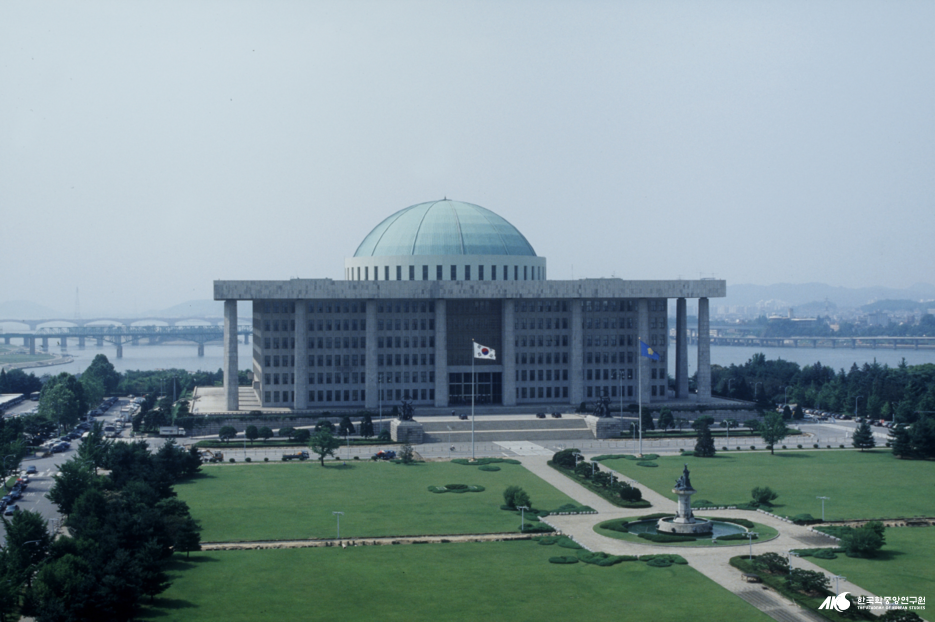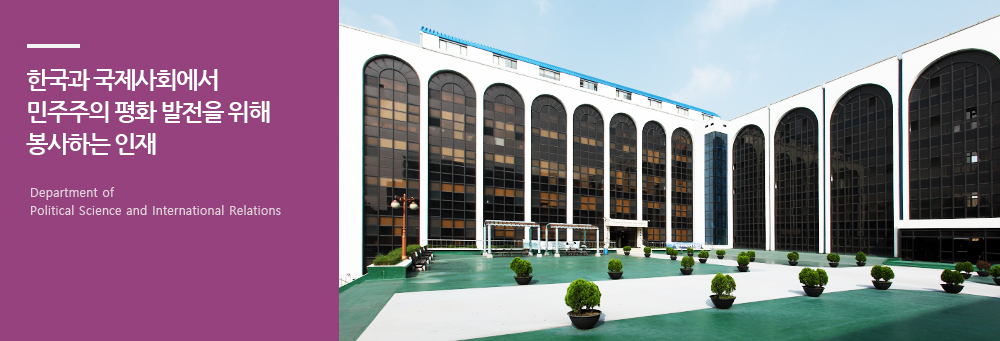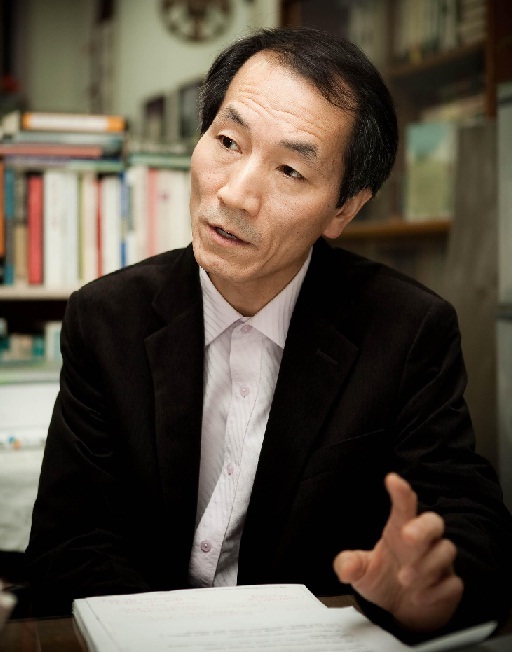Political diplomacy plays a significant role in resolving conflicts between countries that arise from historical, economic, ideological, and territorial disputes and conflicts in the international community. Political diplomacy, a study that explores and understands rapidly changing domestic and foreign situations, identifies social problems and studies solutions through logical analysis. There is a growing Interest in political diplomacy in modern society, where domestic and foreign problems exist. From now, we will explain what political diplomacy is and introduce the department of political diplomacy at Inha University.
What is political diplomacy?
 |
Political Diplomacy pursues a scientific understanding of political phenomena to train professionals for work in the fields of politics and diplomacy. Also, political diplomacy seeks solutions to conflicts in various fields between countries in the international community. Transnational issues such as Covid-19 vaccine intellectual property rights and Amazon rainforest destruction have emerged recently, and the influence of international organizations, NGOs, and multinational companies has increased in the international community. In other words, Political Diplomacy aims to develop societies through analysis of political phenomena based on political ideas and theories and to study solutions to problems.
The major subjects of Political Diplomacy are international politics, modern political theory, Korean diplomacy, fundamentals of politics, and foreign policy theory. Typically, fundamentals of politics is a subject that presents basic concepts of politics, power, leadership, political processes, political socialization, and concepts and theories in international politics. Foreign policy theory is a subject that examines various approaches and theories that facilitate understanding of the foreign policy decision process and promotes and in depth understanding of historical fluctuations.
Careers in Political Diplomacy
Political diplomacy studies rapidly changing domestic and international political phenomena and international issues, requiring attention and awareness of problems on political, social, and economic issues both in Korea and other countries such as in the Israeli-Palestinian conflict. Moreover, political and international phenomena are viewed from various perspectives based on logical analysis and reasoning. In addition, foreign language skills are important when entering the international community, such as learning Spanish for diplomacy in South America.
Political diplomacy can lead to a wide range of related jobs because it deals with overall social phenomena and major topics. It can lead political and diplomatic government and public institutions such as central and local governments, or academic and research institutes such as social policy research institutes, and international negotiation strategy research institutes. Political diplomacy can also open doors to various companies and industries, such as broadcasting. Representatives of Inha University's Department of Political Diplomacy include Choi Bum-joon, a legislative investigator at the Seoul Metropolitan Council, Choi Young-mi, a professor at Jeonnam National University, and Jeon Sang-heon, deputy director of the Gyeongsang Ilbo.
Department of Political Diplomacy at Inha University
 |
Inha University's Department of Political Diplomacy started as the Diplomacy Department in 1979, and it became the Department of Political Diplomacy in 1982, and was reorganized as the Social Science University in September 1988. Inha University's Department of Political Diplomacy has a wide range of educational content on political phenomena around the world. In addition, professors are planning and conducting many network activities such as "Night of Political Diplomats" where they host question and answer sessions and relate stories of experiences by alumni in each field.
Inha University's Department of Political Diplomacy trains political, administrative, and diplomatic leaders and productive democratic citizens who serve the nations, peoples, and citizens of the world. In order to achieve this, clean and fair government officials of national affairs, globally talented people who consider both national interests and peace, and democratic citizens who serve their neighbors and society are set as human resources.
Inha University's Department of Political Diplomacy hosts four conferences, which communicate with others and cultivate a practical attitude for the convergence of pure academic and practical knowledge. One of these is 'SITO World,' an academic association that selects current issues and conducts discussions. From 1994 to 2021, they have been deeply considering and sharing opinions on social issues through regular current affairs discussion. Inha University's Department of Political Diplomacy also operates four small groups, including, ‘Revolution’ and ‘UNICON’, that build friendships among colleagues and peers through sports, music, and academic exploration.
Interview with Professor Jung Young-tae of Inha University's Department of Political Diplomacy
 |
The Inha Times(IT): Please introduce yourself.
Professor Jung: My name is Youngtae Jung, and I have been teaching Korean and comparative politics mainly in the Department of Political Diplomacy from 1989 to the present. I have participated in real politics as well as studies such as the development of party policy and labor union political activities. As well as Korea, I am interested in third world and Western European party elections as well as South American and Middle Eastern countries.
Recently, rather than party elections, I am interested in solutions that will help people, not only in Korea but also in other countries, to study the wide-ranging conflicts in daily life, such as labor-management, regional, and foreign conflicts.
IT: Why did you choose politics and diplomacy as your major?
Professor Jung: I entered the social science university that had an undergraduate system without a fixed major. My family wanted me to take the judicial exam, but I was not interested in that. But I didn't know what I was good at, so I didn't know what I would do in the future if I didn't take the judicial exam. So I entered the Department of Political Diplomacy, a department where I could take a national exam. When I was a college student, I found my culture, society, and psychology lectures to be more interesting than politics so read many books related to those subjects.
After that, I happened to go to graduate school to study. After entering graduate school, I learned political thought and political philosophy deeply and it was very interesting. From then on, I fell into political diplomacy because it was fun to study human behavior in terms of psychological and social systems. And when I studied abroad, Korea was a dictatorship. I thought it would be nice if I could contribute to creating a society where people can live happily, thinking about Korea. Therefore, I have no regrets about choosing my major. Since our lives themselves are politics, I think everyone should know and do politics diplomacy. And I think it is my role to let students know these things and I'm satisfied.
IT: Are there any characteristics of Inha University's Department of Political Diplomacy?
Professor Jung: First, professors have a unique affection for students. Even after retirement, they are going to help students with events such as internship opportunities, outside competition, mock parliament, etc. And there are many students who are humble in learning and try hard to achieve their goals. Also, the graduates who taught work hard at work and sometimes come to give special lectures to students. Not everyone has jobs directly related to the diplomacy of politics, but there are many students who have general jobs.
However, even if students don't have a job related to politics diplomacy, graduates mind is different. they think they hope what I'm doing will be helpful for the social development of society. There is an influence that professors constantly say that you should contribute to a better society, but I think students have flexible thoughts, are active, and are interested in social issues. I don't think there are many students who think about social problems with their future, not just employment. In this regard, I think professors and students of the Department of Political Diplomacy at Inha University are unique in a good way.
IT: Do you have any memorable classes?
Professor Jung: Korean politics class is the most memorable. In particular, students in the Department of Political Diplomacy after democratization are interested in Korean politics because it is for reference to politics from other countries and they hope that Korean politics will eventually work out. In Korean politics classes, students dealt with topics such as those sacrificed in the democratization process and those sacrificed in ideological conflicts and felt strongly that we could live as we do now thanks to these people and that we should do our part. And I shared and talked to students about areas such as local conflicts, workers, especially the protection of irregular workers' rights, and provided them with a foothold for action to solve them in society.
Based on this, I am proud to see that students go out to society and make their own efforts. Because I think I have indirectly contributed to a small part of social change. So, I feel better about the students doing well than receiving the research award.
IT: Is there anything difficult about the political diplomacy class?
Professor Jung: There is nothing particularly difficult, but there are many misunderstandings about politics. When I think about the diplomacy of politics, it hurts to recognize it as fraudulent or manipulative. Political diplomacy plays the most important role in our lives, but it is a big difficulty that most people`s views highlight the bad side. I think this is because bad cases remain strong in memory. Even students majoring in political diplomacy have negative perceptions. In this case, I am not excited during the class, and I feel bitter because people think negatively about what I do and the topic.
IT: Is there any form or content of the class you want to do in the future?
Professor Jung: I'd like to have a debate-oriented class with a capacity of about 20 people. Because politics is not about finding the right answer, but about making the answer through communication. Also, knowledge without practice is meaningless as all studies do. In order to gain knowledge that can be applied to reality, I would like to do a class where students can participate directly.
This is because I think there is nothing better than discussion in a way that a topic can be made into your own rather than making a lot of progress in the class. And I want to have a political psychology class on what psychological state and conditions influence people from within until they make decisions. I don't have a major class right now, but I want to let students know more deeply about these subjects that are fused with other studies. Political psychology is very interesting.
IT: What do you think about the phenomenon of political aversion and apathy among many young people?
Professor Jung: Before democratization in Korea, most young people thought that the system was basically wrong, and they acted directly for change because they knew that problems such as corruption, human rights oppression, and regional imbalance development were emerging. I think most young people are also aware of social problems now. However, I think about the reasons for political aversion and indifference, seniors were well employed until the 80s and 90s. They got a decent regular job after graduation regardless of whether they participated in the social movement or not, but it changed after the IMF. The number of university students increased but jobs were limited, and companies increased non-regular workers for profits. In other words, it has become difficult to get a regular job even after graduating from a four-year university after the IMF.
Also, some companies control the economy of our country, so if politicians want to touch non-regular workers and unemployed, it is difficult for the government to boycott the company, so young people feel that the government is incompetent. Since Korean society is structurally enterprise-oriented, what politics can do is limited, so there are not many real politicians can do within a set period. The fundamental cause of this can be seen as a phenomenon that emerged when democracy and capitalism combined. In this situation, most young people think that they are angry because they are not getting a good job after graduating from college and have a headache in housing, marriage, and childbirth. The anger of these young people was directed at politicians because they did not know the fundamental political structure.
I think this has spread distrust and indifference towards politicians. I fully understand that young people are angry. However, I hope young people study the root causes and try to change the current economic system for the better, just as the older generation changed the political system through democratization. So even if the process of changing is tough, we should continue to strive for a good future that will come. I think it can be changed if you try like this. After all, it is a society in which we will live and the next generation will live, so all young people regardless of their major should pay attention.
IT: Is there anything you would like to say to students who are currently studying Political Diplomacy or want to major in Political Diplomacy?
Professor Jung: In the end, all decisions are made through people. Therefore, I would like to say students have to study the movement of the human inner world, the power to move the mind, and the law with more interest. If these studies and systems are combined, I think it will be a better study and result. Of course, students study politics diplomacy hard and read related books like liberal arts, human inner world when they have free time. If students do this, I think they can become better political diplomacy students.
Diplomacy is all external relations between countries negotiated in the international community. And politics is the whole process of expressing and consulting one's opinions in relationships with other people or institutions in our lives, as well as the actions of gaining and maintaining the power of the state. In other words, politics and diplomacy are closely related to our lives, so we must engage with interest in solving our rights and problems. This is because we can further change society positively by continuing the knock that can turn walls into doors through interest and action.
고혜빈 heyheybin@inha.edu
<저작권자 © 인하프레스, 무단 전재 및 재배포 금지>

![[보도] 제43대 총학생회 후보자 공청회 개최돼](/news/photo/202404/11686_5015_2626.png) [보도] 제43대 총학생회 후보자 공청회 개최돼
[보도] 제43대 총학생회 후보자 공청회 개최돼
![[보도] 제43대 총학생회 후보자 공청회 개최돼](/news/thumbnail/202404/11686_5015_2626_v150.jpg)
![[보도] 총학생회장 선거 열려···학생사회 대표자는?](/news/thumbnail/202403/11668_5014_266_v150.jpg)
![[보도] 무전공·계열제 논의···학생은 어디에?](/news/thumbnail/202403/11666_5011_2238_v150.jpg)
![[보도] 인하 70돌, 다양한 행사 이어져](/news/thumbnail/202403/11663_5009_165_v150.jpg)
